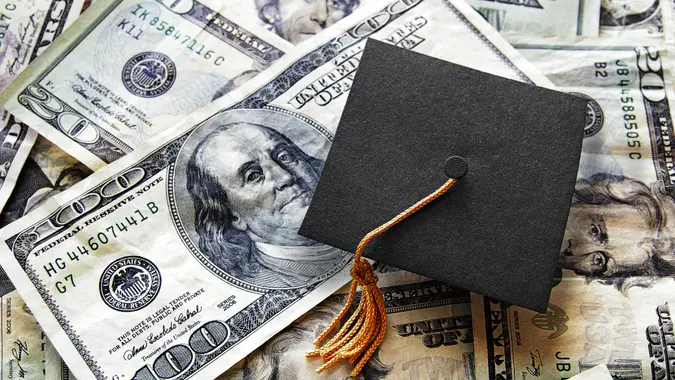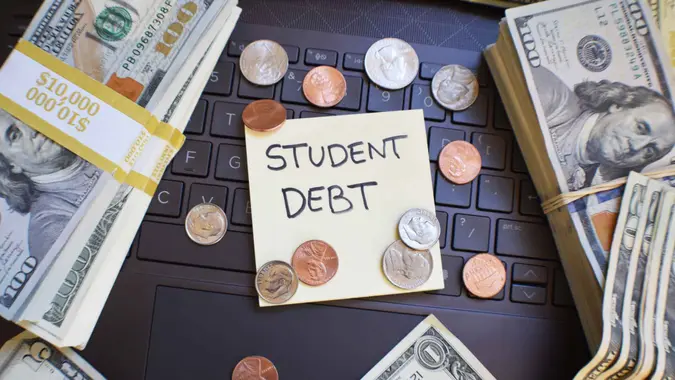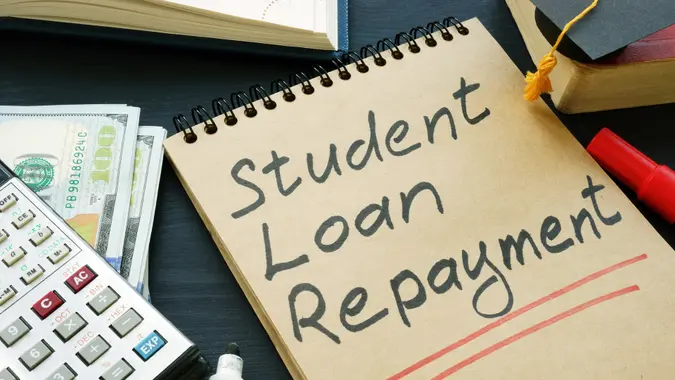Student Loans: How To Get a Late Payment Removed From Your Credit History After a Billing Error

Commitment to Our Readers
GOBankingRates' editorial team is committed to bringing you unbiased reviews and information. We use data-driven methodologies to evaluate financial products and services - our reviews and ratings are not influenced by advertisers. You can read more about our editorial guidelines and our products and services review methodology.

20 Years
Helping You Live Richer

Reviewed
by Experts

Trusted by
Millions of Readers
Now that the more than three-year COVID-19 student loan payment pause has come to an end, 28 million borrowers have entered repayment since Oct. 1, 2023. With this massive transition from a full payment pause to millions having payments due all at once, many are concerned about how missed payments, administrative forbearances, and reporting errors will adversely impact their credit scores.
MarketWatch explained that the Biden administration is warning credit score companies and credit reporting agencies not to decrease people’s credit scores over missed payments as millions resume paying their debt after a more than three and half year pause.
The Office Of Federal Student Aid Speaks Out
Richard Cordray, the chief operating officer of the Office of Federal Student Aid, contributed to a letter that the agency is sending to the credit score reporting companies and agencies.
“I write to strongly urge you to revisit how your company will treat federal student loan obligations for purposes of credit reporting and credit scoring during the return to repayment,” he said. Condray also expressed that it would be “inappropriate” for existing credit scoring models to base creditworthiness on things like periods of forbearance, an increase in loan balance due to interest accruing, or signs of a reduced or missed payment during this transition period.
“These actions are taking place in a fundamentally different context than any other time and are a substantially less reliable indicator of unwillingness or inability to pay,” explained Condray.
This letter comes after many weeks of complaints from student loan borrowers after payments resumed on Oct. 1, 2023. In the months leading up to and now that the payments have resumed, many borrowers have had trouble receiving accurate information regarding their student loan payments as well as extremely long wait times when trying to contact their student loan servicers.
So, not only are late payments affecting credit scores, but student loan servicer errors are making the return to repayment confusing and difficult.
Delinquent vs. Defaulted Student Loan Accounts
Student Loan Planner reported that your student loan servicer will report a late payment to the major credit bureaus, which include Transunion, Equifax and Experian, if you end up missing them or falling behind. Delinquent monthly payments can have very adverse effects on your credit score, which can make it difficult to be approved for credit cards and loans in the future. But, defaulted accounts can create more serious financial issues.
Your student loan account can fall into either of these two categories once you’ve missed payments:
Delinquent Accounts
A delinquent account means that you’re behind on your payments. For most private student loan lenders, they’ll wait at least 30 days before reporting your missed payments. Meanwhile, student loan servicers for federally held student loans from the U.S. Department of Education will wait until your payments are 90 days late before reporting your missed payments.
Defaulted Accounts
A student loan enters default status after it has been delinquent for at least 270 days. If your account defaults, you may experience effects such as future ineligibility for both federal and state student financial aid, your tax refunds being withheld, garnishment of wages, and a severely damaged credit score.
Having either a delinquent or defaulted account can mean serious problems when it comes to your credit score. If your account is delinquent you’ll want to take action as soon as possible to avoid it from becoming defaulted.
How To Get Late Student Loan Payments Removed From Your Credit History
First, if the error on your credit report is due to inaccurate information from your loan servicer, you have the right to file a dispute with each of the credit bureaus that shows the error on your credit report. Thanks to the Fair Credit Reporting Act, credit bureaus are usually required to investigate matters like these within 30 days.
If you’re paid up on your loans and you still see inaccurate information that’s impacting your credit report, you can file a dispute directly with your loan servicer. Here’s how, according to Student Loan Planner:
- Download and print a credit dispute form from your loan servicer.
- Fill out the form. Information that’s typically needed when completing the form includes your student loan account number (or Social Security number) as well as specific details about your dispute. It’s important to keep a copy of the completed form for your records.
- Mail the completed form to your loan servicer’s address via the contact information on their website. Sometimes, it’s possible to submit documents to your loan servicer via fax, online portal, or another method. When submitting your payment history dispute, be sure to include any supporting information, such as a copy of the credit report from the credit reporting agencies.
If you don’t get a timely response from your loan servicer, you can file a complaint with the Consumer Financial Protection Bureau (CFPB).
If you are late on your student loan payments and it’s not due to an error, it’s best to contact your student loan servicer immediately. A few tips to regain good standing on your student loan account include catching up on your missed payments right away, setting up autopay to prevent future missed payments, or requesting a new monthly payment due date that’s more aligned with your cash flow.
More From GOBankingRates
 Written by
Written by 

























